Textbook Alternatives

This Open Education Week, MacEwan Library encourages faculty and students to visit our new Textbook Alternatives Guide.
The Library has created this guide to help students and instructors find textbook alternatives that are more affordable while still supporting student learning.
If you have questions about possible options, connect with your Subject Librarian.
Digital Display: Women's History Month
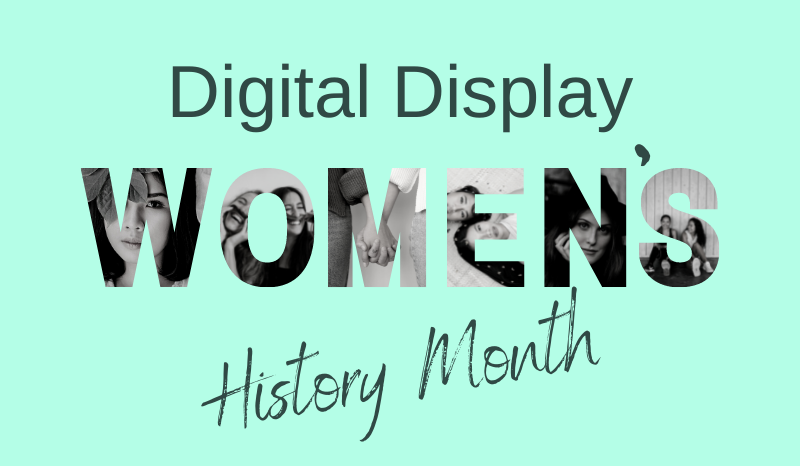
March is Women's History Month! To help celebrate, MacEwan Library has created a physical book display which you can visit in-person as well as this digital display.
To Read:
A Gentlewoman in Upper Canada: The Journals, Letters and Art of Anne Langton by Barbara Williams
A Tangled Web by L.M. Montgomery and Benjamin Lefebvre
Agnes Macphail: Champion of the Underdog by Rachel Wyatt
Canadian Women in Print, 1750–1918 by Carole Gerson
I'm Not Myself at All: Women, Art, and Subjectivity in Canada by Kristina Huneault
Madeleine Parent: Activist by Andrée Lévesque
Mapping Our Selves: Canadian Women's Autobiography by Helen M. Buss
Paddling her Own Canoe: The Times and Texts of E. Pauline Johnson (Tekahionwake) by Veronica Jane Strong-Boag and Carole Gerson
Settler Feminism and Race Making in Canada by Jennifer Henderson
The Peacemaker: Thanadelthur by David Alexander Robertson and Wai Tien
This Wild Spirit: Women in the Rocky Mountains of Canada by Colleen Marie Skidmore
To Watch:
Mary Two-Axe Earley: I Am Indian Again
Black History Month Student Project: Amazing Albertans
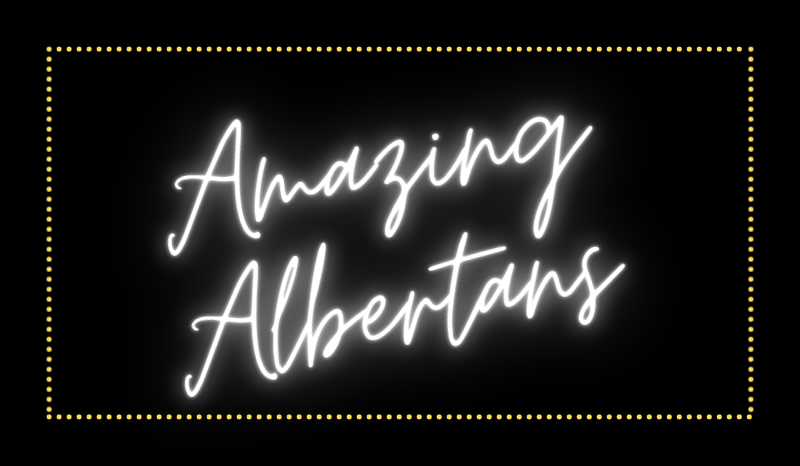
Amazing Albertans is a series about influential Black Albertans, created by MacEwan University Students Elaine Tran, Lauren McMullen, Jasleen Kang, Sarah Green, Samantha Diluvio, and Sarah Higgins.
Originally produced for Sustainability 301 with Dr. Tai Munro in Fall 2021, we are happy to share their work and celebrate these important Albertans during Black History Month.
A screen-reader friendly version is below.
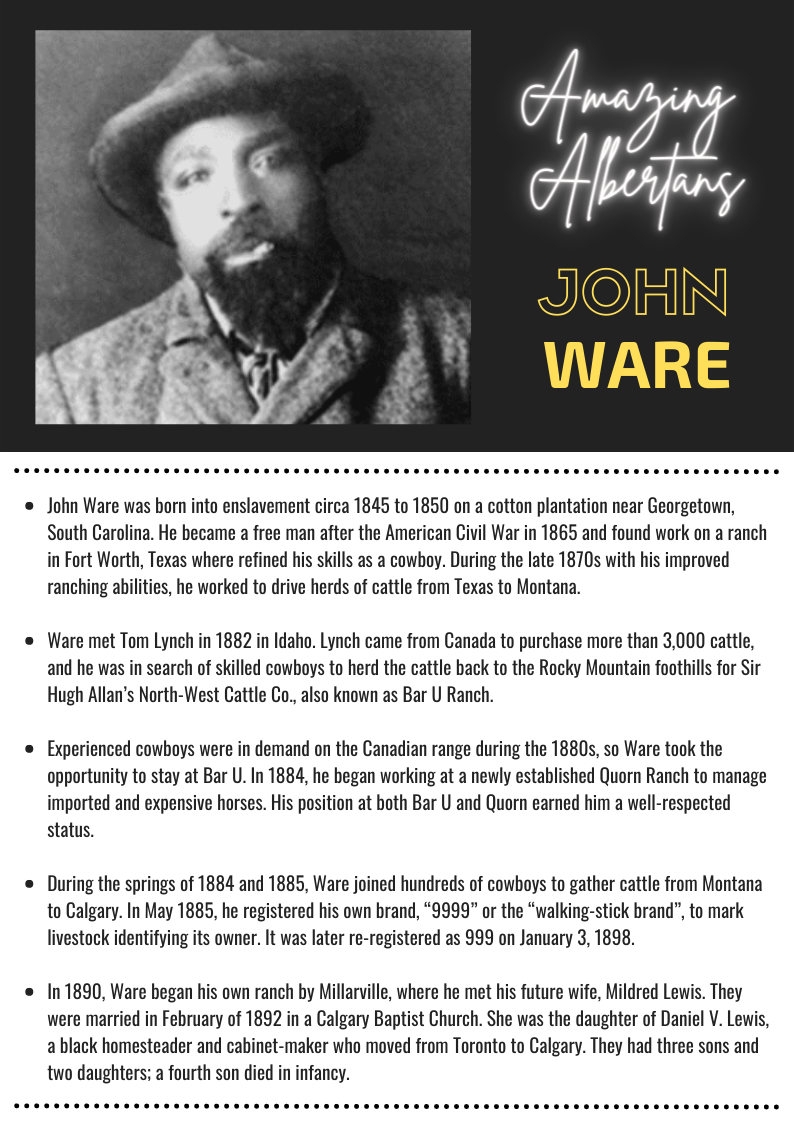
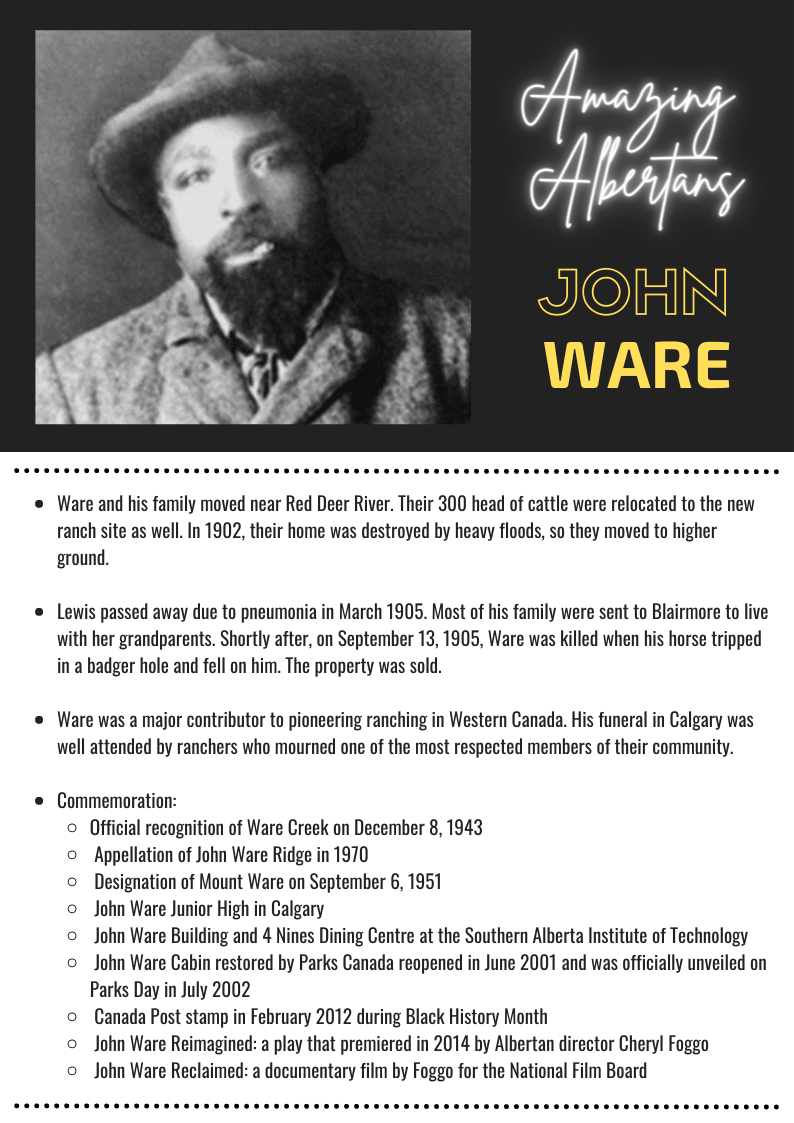
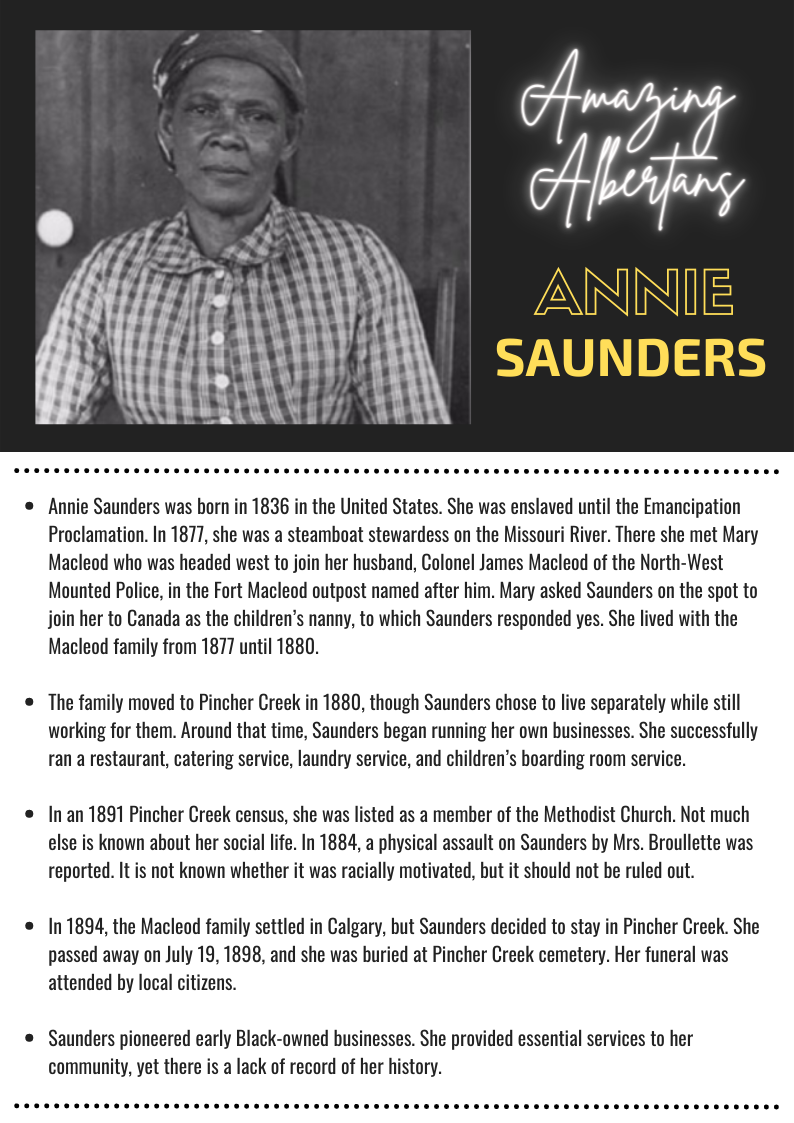
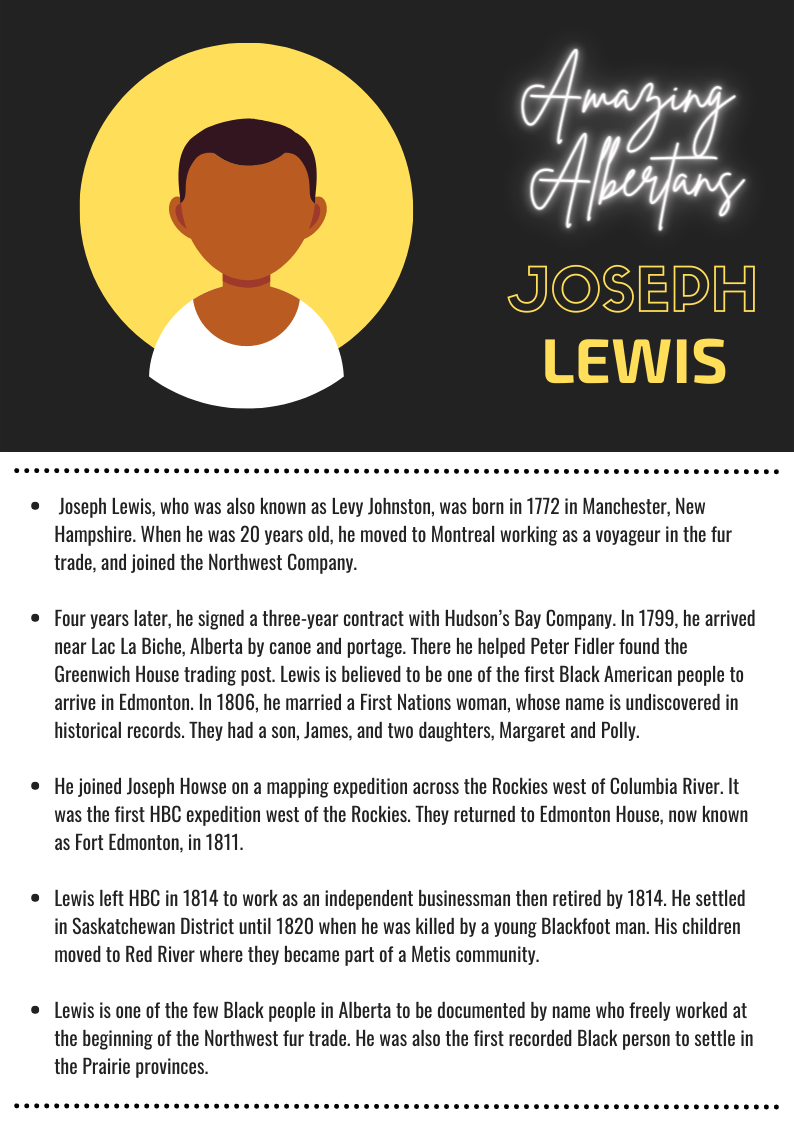
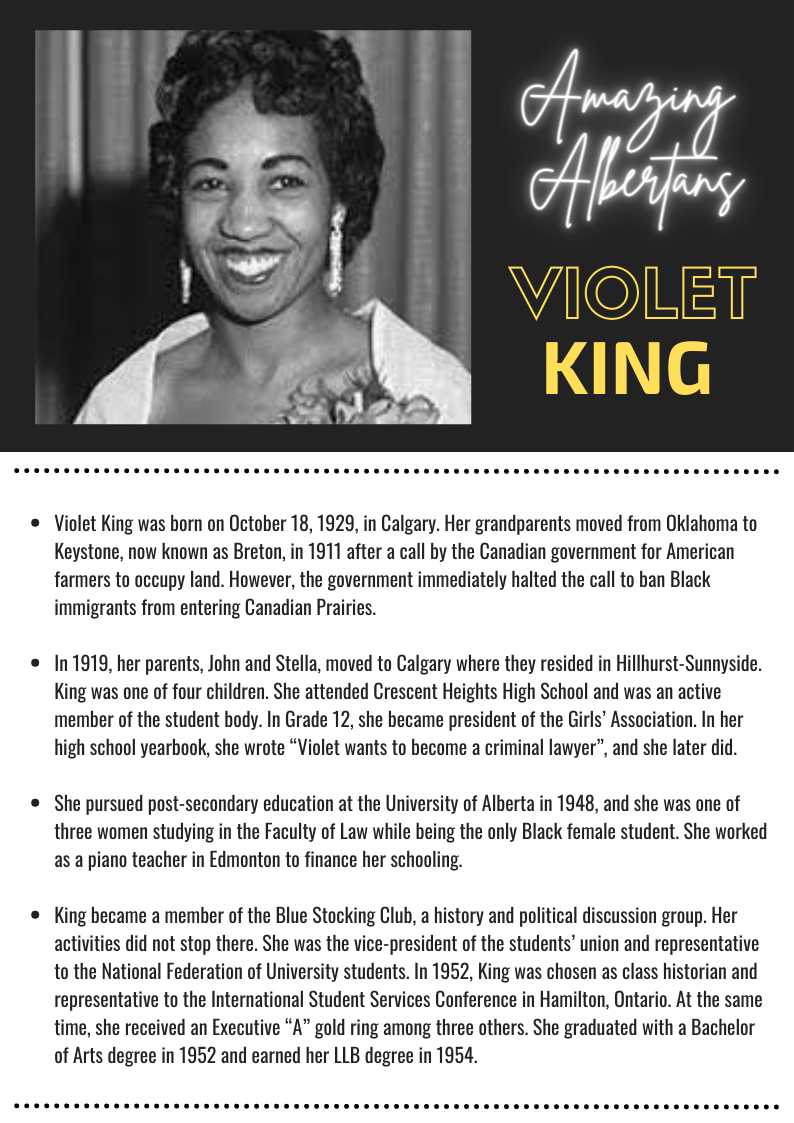
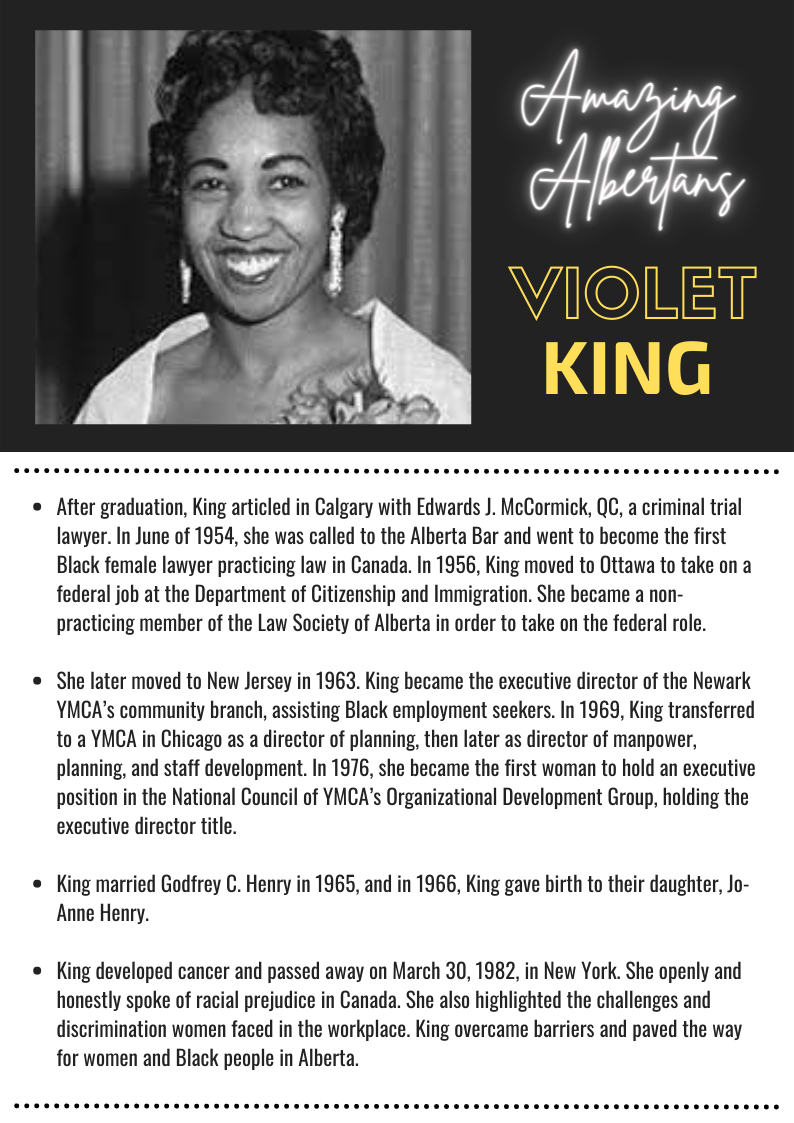
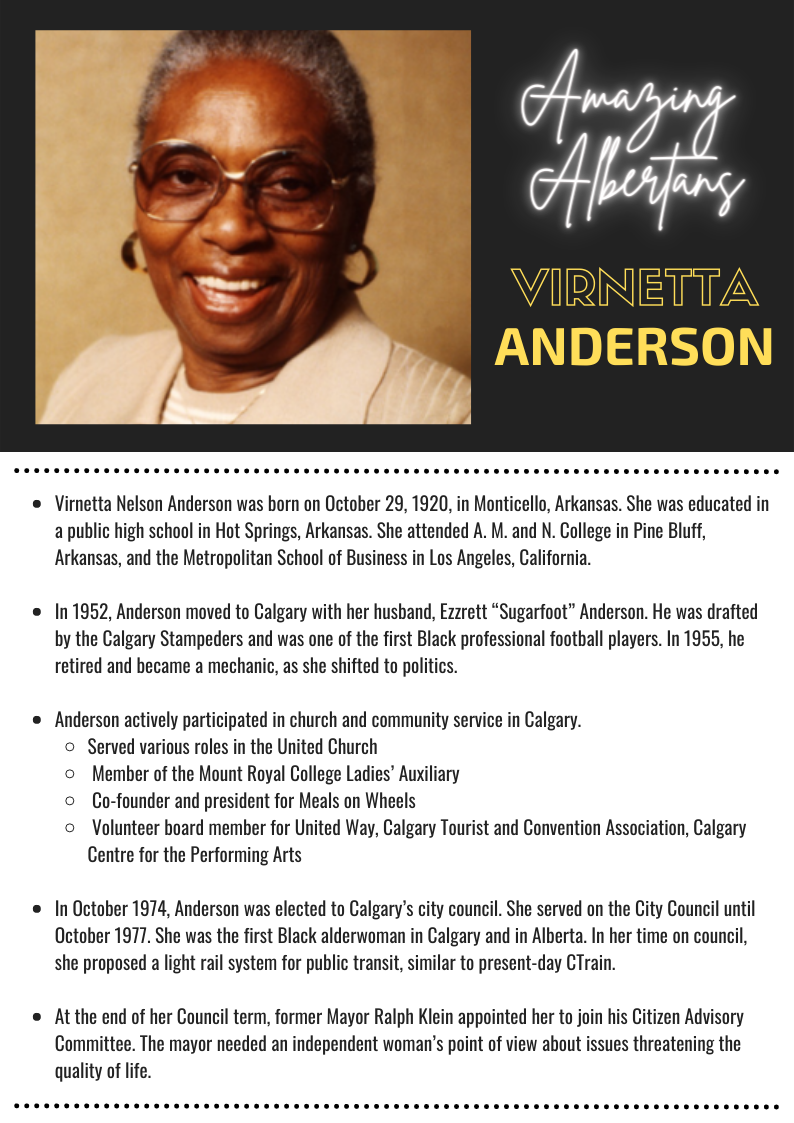
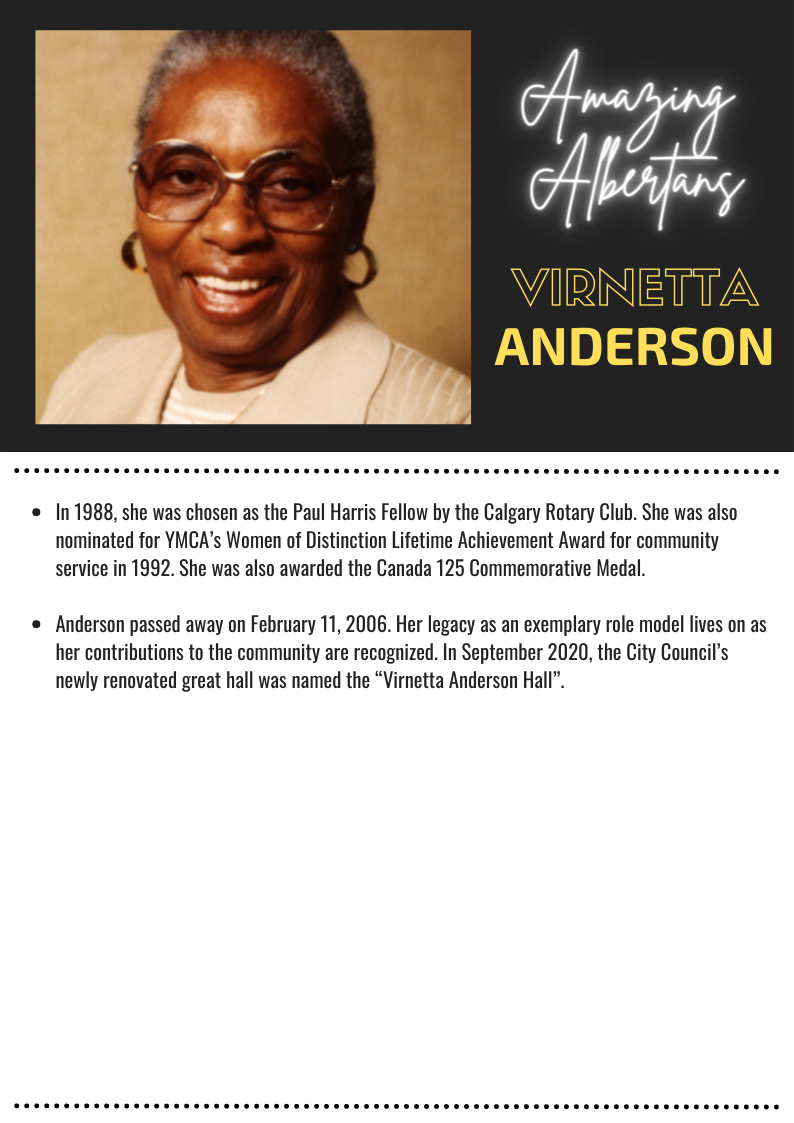

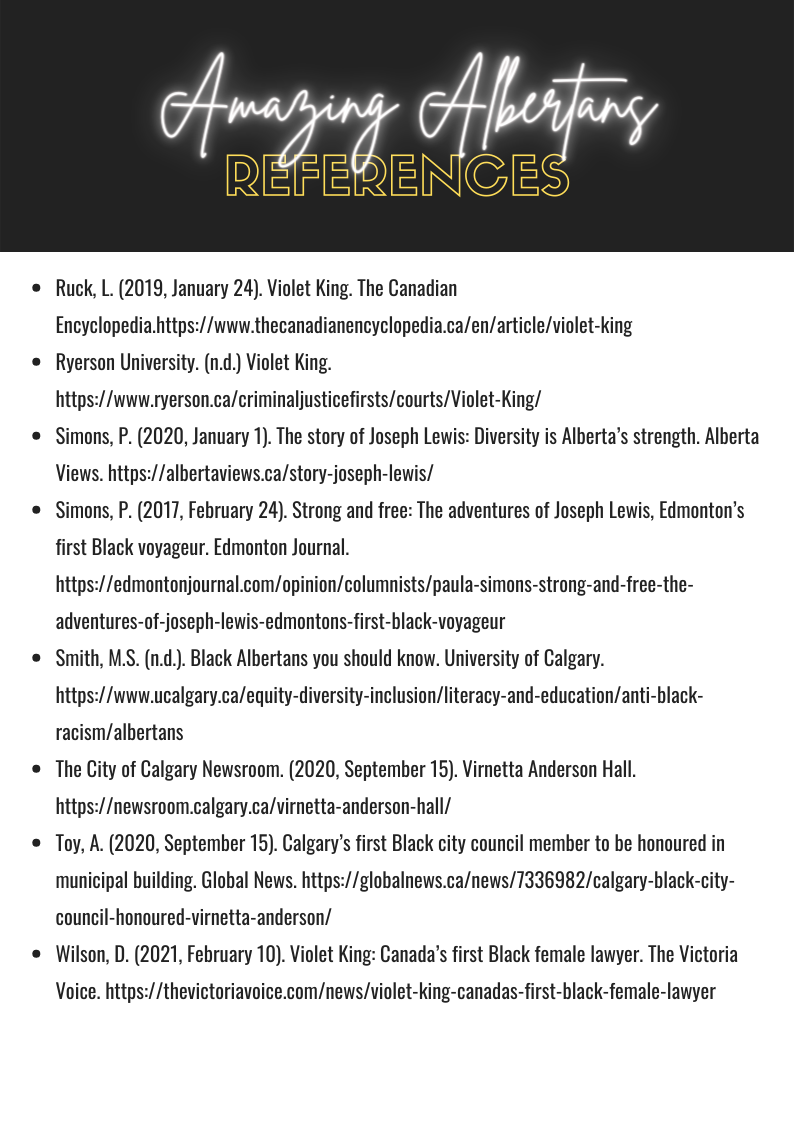
Thank you for sharing your work with us Elaine, Lauren, Jasleen, Sarah G., Samantha, and Sarah H.
______________________________
Amazing Albertans: Text-Only Version
Amazing Albertans is a series about influential Black Albertans, created by MacEwan University Students Elaine Tran, Lauren McMullen, Jasleen Kang, Sarah Green, Samantha Diluvio, and Sarah Higgins.
Originally produced for Sustainability 301 with Dr. Tai Munro in Fall 2021, we are happy to share their work and celebrate these important Albertans during Black History Month.
Amazing Albertans: John Ware
John Ware was born into enslavement circa 1845 to 1850 on a cotton plantation near Georgetown, South Carolina. He became a free man after the American Civil War in 1865 and found work on a ranch in Fort Worth, Texas where he refined his skills as a cowboy. During the late 1870s with his improved ranching abilities, he worked to drive herds of cattle from Texas to Montana.
Ware met Tom Lynch in 1882 in Idaho. Lynch came from Canada to purchase more than 3,000 cattle, and he was in search of skilled cowboys to herd the cattle back to the Rocky Mountain foothills for Sir Hugh Allan's North-West Cattle Co., also known as Bar U Ranch.
Experienced cowboys were in demand on the Canadian range during the 1880s, so Ware took the opportunity to stay at Bar U. In1884, he began working at a newly established Quorn Ranch to manage imported and expensive horses. His position at both Bar U and Quorn earned him a well-respected status.
During the springs of 1884 and 1885, Ware joined hundreds of cowboys to gather cattle from Montana to Calgary. In May 1885, he registered his own brand, "9999'' or the "walking-stick brand," to mark livestock identifying its owner. It was later re-registered as 999 on January 3, 1898.
In 1890, Ware began his own ranch by Millarville, where he met his future wife, Mildred Lewis. They were married in February of 1982 in a Calgary Baptist church. She was the daughter of Daniel V. Lewis, a black homesteader and cabinet-maker who moved from Toronto to Calgary. They had three sons and two daughters; a fourth son died in infancy.
Ware and his family moved near Red Deer River. Their 300 head of cattle were relocated to the new ranch site as well. In 1902, their home was destroyed by heavy floods, so they moved to higher ground.
Lewis passed away due to pneumonia in March 1905. Most of his family were sent to Baltimore to live with her grandparents. Shortly after, on September 13, 1905, Ware was killed when his horse tripped in a badger hole and fell on him. The property was sold.
Ware was a major contributor to pioneering ranching in Western Canada. His funeral in Calgary was well attended by ranchers who mourned one of the most respected members of their community.
Commemoration:
- Official recognition of Ware Creek on December 8, 1943
- Appellation of John Ware Ridge in 1970
- Designation of Mount Ware on September 6, 1951
- John Ware Junior High in Calgary
- John Ware Building and 4 Nines Dining Centre at the Southern Alberta Institute of Technology
- John Ware Cabin restored by Parks Canada reopened in June 2001 and was officially unveiled on Parks Day in July 2002.
- Canada Post stamp in February 2012 during Black History Month
- John Ware Reimagined: a play that premiered in 2014 by Albertan director Cheryl Foggo
- John Ware Reclaimed: a documentary film by Foggo for the National Film Board
Amazing Albertans: Annie Saunders
Annie Saunders was born in 1836 in the United States. She was enslaved until the Emancipation Proclamation. In 1877, she was a steamboat stewardess on the Missouri River. There she met Mary Macleod, who was headed west to join her husband, Colonel James Macleod of the North-West Mounted Police, in the Fort Macleod outpost named after him. Mary asked Saunders on the spot to join her in Canada as the children’s nanny, to which Saunders responded yes. She lived with the Macleod family from 1877 until 1880.
The family moved to Pincher Creek in 1880, though Saunders chose to live separately while still working for them. Around that time, Saunders began running her own businesses. She successfully ran a restaurant, catering service, laundry service, and children’s boarding room service.
In an 1891 Pincher Creek census, she was listed as a member of the Methodist Church. Not much else is known about her social life. In 1884, a physical assault on Saunders by Mrs. Broulette was reported. It is not known whether it was racially motivated, but it should not be ruled out.
In 1894, the Macleod family settled in Calgary, but Saunders decided to stay in Pincher Creek. She passed away on July 19, 1898, and she was buried at Pincher Creek cemetery. Her funeral was attended by local citizens.
Saunders pioneered Black-owned businesses. She provided essential services to her community, yet there is a lack of record of her history.
Amazing Albertans: Joseph Lewis
Joseph Lewis, who was also known as Levy Johnston, was born in 1772 in Manchester, New Hampshire. When he was 20 years old, he moved to Montreal working as a voyageur in the fur trade, and joined the Northwest Company.
Four years later, he signed a three-year contract with Hudson’s Bay Company. In 1799, he arrived near Lac La Biche, Alberta, by canoe and portage. There he helped Peter Fidler found the Greenwich House Trading Post. Lewis is believed to be one of the first Black American people to arrive in Edmonton. In 1806, he married a First Nations woman, whose name is undiscovered in historical records. They had a son, James, and two daughters, Margaret and Polly.
He joined Joseph Howse on a mapping expedition across the Rockies west of Columbia River. It was the first HBC expedition west of the Rockies. They returned to Edmonton House, now known as Fort Edmonton, in 1811.
Lewis left HBC in 1814 to work as an independent businessman, then retired by 1814. He settled in Saskatchewan District until 1820 when he was killed by a young Blackfoot man. His children moved to Red River where they became part of a Metis community.
Lewis is one of the few Black people in Alberta to be documented by name who freely worked at the beginning of the Northwest fur trade. He was also the first recorded black person to settle in the Prairie provinces.
Amazing Albertans: Violet King
Violet King was born on October 18. 1929, in Calgary. Her grandparents moved from Oklahoma to Keystone, now known as Breton, in 1911 after a call from the Canadian government for American farmers to occupy land. However, the Government immediately halted the call to ban Black immigrants from entering the Canadian Prairies.
In 1919, her parents, John and Stella, moved to Calgary, where they resided in Hillhurst-Sunnyside. King was one of four children. She attended Crescent Heights High School and was an active member of the student body. In Grade 12, she became president of the Girls’ Association. In her high school yearbook, she wrote, “Violet wants to become a criminal lawyer,” and she later did.
She pursued post-secondary education at the University of Alberta in 1948, and she was one of three women studying in the Faculty of Law while being the only Black female student. She worked as a piano teacher in Edmonton to finance her schooling.
King became a member of the Blue Stocking Club, a history and political discussion group. Her activities did not stop there. She was the vice president of the students’ union and representative to the National Federation of University Students. In 1952, King was chosen as class historian and representative to the International Student Services Conference in Hamilton, Ontario. At the same time, she received an Executive “A” gold ring among three others. She graduated with a Bachelor of Arts degree in 1952 and earned her LLB degree in 1954.
After graduation, King articled in Calgary with Edwards J. McCormick, QC, a criminal trial lawyer. In June of 1954 she was called to the Alberta Bar and went on to become the first Black female lawyer practicing law in Canada. In 1956. King moved to Ottawa to take on a federal job at the Department of Citizenship and Immigration. She became a non-practicing member of the Law Society of Alberta in order to take the federal role.
She later moved to New Jersey in 1963. King became the executive director of the Newark YMCA’s community branch, assisting Black employment seekers. In 1969, King transferred to a YMCA in Chicago as a director of planning, then later as director of manpower, planning, and staff development. In 1976, she became the first woman to hold an executive position in the National Council of YMCA’s Organizational Development Group, holding the executive director title.
King married Godfrey C. Henry in 1965, and in 1966, King gave birth to their daughter, Jo-Anne Henry.
King developed cancer and passed away on March 30. 1982, in New York. She openly and honestly spoke of racial prejudice in Canada. She also highlighted the challenges and discrimination women faced in the workplace. King overcame barriers and paged the way for women and Black people in Alberta.
Amazing Albertans: Virnetta Anderson
Virnetta Nelson Anderson was born on October 29,1920, in Monticello, Arkansas. She was educated in a public high school in Hot Springs, Arkansas. She attended A. M. and N. College in Pine Bluff, Arkansas, and the Metropolitan School of Business in Los Angeles, California.
In 1952, Anderson moved to Calgary with her husband Ezzrett “Sugarfoot” Anderson. He was drafted by the Calgary Stampeders and was one of the first Black professional football players. In 1955, he retired and became a mechanic, as she shifted to politics.
Anderson actively participated in church and community service in Calgary:
- Served various roles in the United Church
- Member of the Mount Royal College Ladies’ Auxiliary
- Co-founder and president for Meals on Wheels
- Volunteer board member for United Way, Calgary Tourist and Convention Association, and Calgary Centre for the Performing Arts.
In October 1974, Anderson was elected to Calgary’s city council. She served on the City Council until October 1977. She was the first Black alderwoman in Calgary and in Alberta. In her time on council, she proposed a light rail system for public transit, similar to the present-day CTrain.
At the end of her Council term, former mayor Ralph Klein appointed her to join his Citizen Advisory Committee. The mayor needed an independent woman’s point of view about issues threatening the quality of life.
In 1988, she was chosen as the Paul Harris Fellow by the Calgary Rotary Club. She was also nominated for the YMCA’s Women of Distinction Lifetime Achievement Award for community service in 1992. She was also awarded the Canada 125 Commemorative Medal.
Anderson passed away on February 11, 2006. Her legacy as an exemplary role model lives on as her contributions to the community are recognized. In September 2020, the City Council’s newly renovated great hall was named the “Virnetta Anderson Hall.”
Thank you for sharing your work with us Elaine, Lauren, Jasleen, Sarah G., Samantha, and Sarah H.
From the Archives: Computers Take Over Reading Week
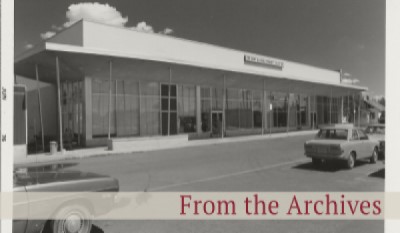
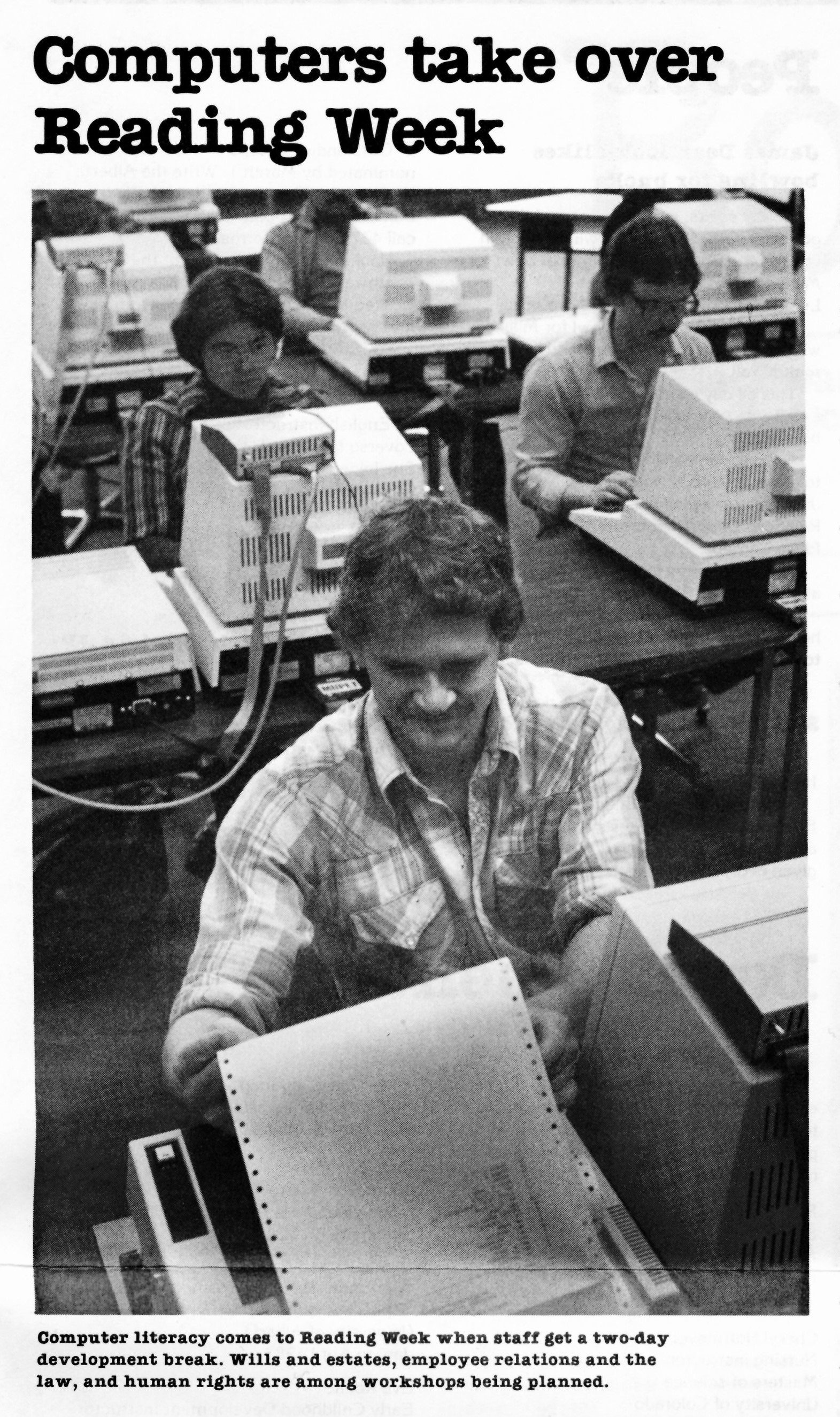
Source: Box 1796, February 16, 1983
For other stories from our past, visit the University Archives.
Making Your Ideas a Reality with Remote 3D Printing
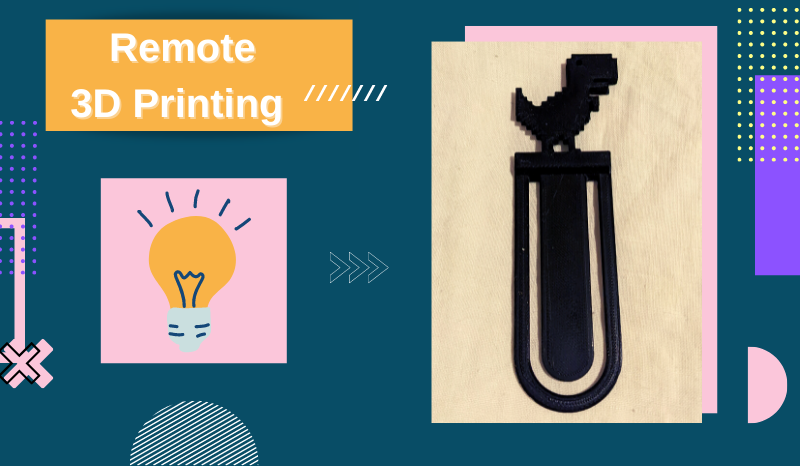
By Reyne Harrington
Are you looking for the perfect personalized item but trying to stick to your student budget? Check out the MacEwan Makerspace!
With campus shut down due to Covid restrictions, going in person to the Makerspace is not currently an option. However, it IS an option to print something remotely, and it's also free! I found an adorable design for a sturdy bookmark on Thingiverse, a free and easy-to-search database of user submitted 3D models, but more tech-savvy students can make their own designs using programs such as Tinkercad.
The next step is to slice it using 3DPrinterOS. ‘Slicing’ creates the instructions that direct the 3D printer on exactly how to go about manifesting the design into physical reality. This allows you to adjust things like speed, density, temperature, the size of the object, and whether or not to use supports for pieces that stick out at a sharper angle. You can then send the file to one of MacEwan’s Ultimaker 3D printers, and even watch it in action through the streaming video feed!
During my experience with remote 3D printing, all of my questions, including the overwhelmingly broad “So…what do I do now?” was answered promptly and courteously by the Makerspace Tech Tutors via email. I was notified upon the completion of my print and was able to pick it up at the library the next day. Something called a ‘brim’ needed to be removed, which is just a thin bit of extra material around the edges that helps with stability during the print, and it snapped off easily without any issues. I think it turned out great!
For more information on 3D printing, you can check out the Makerspace Website, or email makerspace@macewan.ca with direct inquiries and requests. Stay safe and happy printing!
Reyne Harrington (she/her) is in her first year of the Library and Information Technology program at MacEwan University, and works in the Makerspace as a Tech Tutor. She is a mature student with a young family, and an avid gamer.
Digital Display: Black History Month
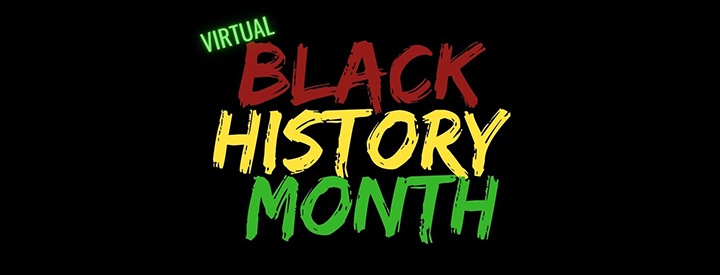
MacEwan is celebrating Black History Month with several events that anyone in the MacEwan community can participate in. We put together this display as part of celebrating Black History Month.
eBooks:
Education, Equality and Justice in The New Normal: Global Responses to The Pandemic by Inny Accioly and Donaldo P. Macedo
Nelson Mandela: Peace Through Reconciliation by Neera Chandhoke
Black and Sexy: A Framework of Racialized Sexuality by Tracie Q. Gilbert
Racial Trauma in The School System: Naming the Pain by Connesia Handford and Ariel Marrero
No Real Choice: How Culture and Politics Matter for Reproductive Autonomy by Katrina Kimport
Black Feminist Sociology: Perspectives and Praxis by Zakiya Luna and Whitney Pirtle
The Poetics of Difference: Queer Feminist Forms in The African Diaspora by Mecca Jamilah Sullivan
In Search of The Color Purple: The Story of an American Masterpiece by Salamishah Tillet
Print Books:
Power Hungry: Women of the Black Panther Party and Freedom Summer and Their Fight to Feed a Movement by Suzanne Cope
A History of The Harlem Renaissance by Rachel Farebrother and Miriam Thaggert
Depictions of Home in African American Literature by Trudier Harris
African Americans in The Human Sciences: Challenges and Opportunities by Vanessa P. Jackson, Jacqueline M. Holland, and Julia R. Miller Arline
Black Lives and Digi-Culturalism: An Afrocentric Perspective by Kehbuma Langmia
African Europeans: An Untold History by Olivette Otele
Beyond Civil Disobedience: Social Nullification and Black Citizenship by Charles Peterson
Meet MacEwan Library's Newest PAWSS Pup
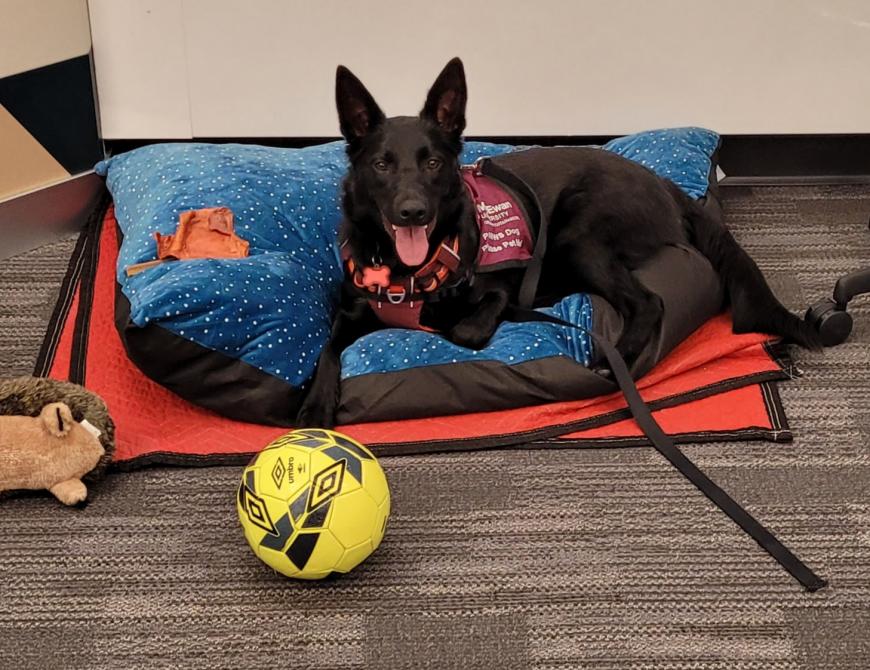
Meet Bella, the newest addition to PAWSS! If you are in need of some puppy cuddles or a much-needed study break, you can find Bella in the Library on Sundays with her handler Jamie.
Digital Display: Mental Health Week
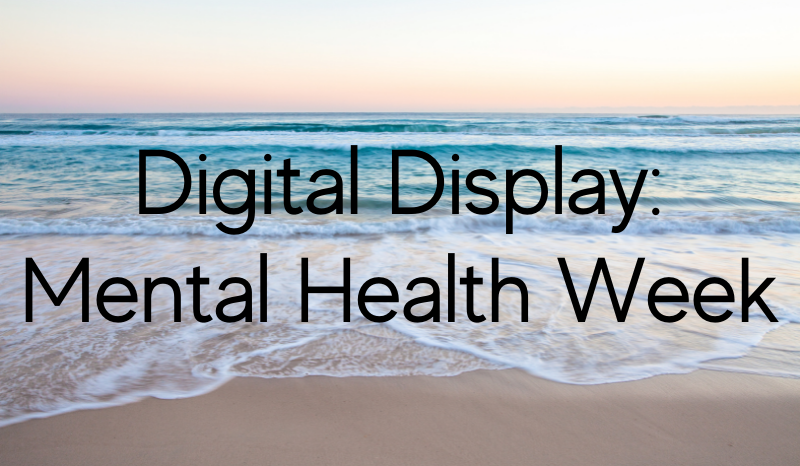
This year, January 24—January 28 is Mental Health Week at MacEwan. Mental Health Week is about building community, raising awareness about mental health issues, and supporting students, faculty and staff who are seeking help or want to be helpful. As part of Mental Health Week, we put together this collection of digital resources about mental health.
If you are concerned about your mental health and are seeking help, please visit the MacEwan Mental Health Resources page.
To Read:
5 Thieves of Happiness – author John Izzo Ph.D is.a Canadian researcher who shares in this ebook how to develop, and defend the happiness that is our true nature.
10 Steps to Mastering Stress: A Lifestyle Approach, Updated Edition – this ebook from Oxford University Press goes through practical strategies for living a more balanced life.
Sustainable Happiness: Live Simply, Live Well, Make a Difference – a ebook collection of essays including Sarah van Gelder, Wendell Berry and other contributors to YES! Magazine, an independent and nonpartisan publication whose goal it is to inspire a more equitable and Earth-friendly world.
To Watch:
Happiness – streaming video part of the series 6 Billion Others that looks at 5000 interviews with people around the world.
Joy of Winter – A CBC documentary from 1962 reminding us why Canada and winter are great.
Stash Short Film Festival: Comedy
Stash Short Film Festival: Comedy 2
Truth About Improving Your Mental Health – a BBC documentary featuring England footballer Alex Scott looking at wellbeing during the pandemic.
Digital Display: Christmas

Did you know we create themed book displays in the library? This is our purely digital version, so you can get in the holiday spirit without even leaving your home!
To Read:
A Christmas Carol by Charles Dickens
Christmas: A Candid History by Bruce David Forbes
Christmas is Germany: a Cultural History by Joe Perry
Inventing the Christmas Tree by Bernd Brunner
The Twelve Cakes of Christmas: An Evolutionary History, with Recipes by H.M. Leach, Mary Browne, and Raelene Inglis
Carolina Christmas: Archibald Rutledge's Enduring Holiday Stories by Jim Casada
To Watch:
To Listen:
Classical Music for The Christmas Holiday, Vol. 1
Opportunity to Publish

Call for Submissions: MacEwan University Student eJournal (MUSe)
Have you produced something worthy of publication this term? The MacEwan University Student eJournal (MUSe) is always looking for new submissions from upper-level students with the endorsement of a faculty member.
Submissions may include scholarly or creative works in any digital format. Works undergo a rigorous peer-review process by fellow students under the mentorship of a faculty section editor.
To submit works and learn more, visit: http://macewan.ca/muse
Questions? Email muse@macewan.ca.